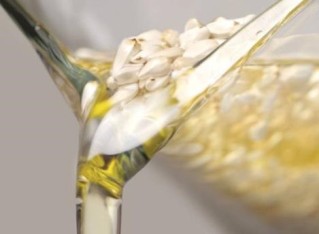The challenge
Beyond petrochemicals
Plant based oils could one day be produced at a large enough scale to replace petrochemicals in industrial products ranging from fuels and lubricants to specialty chemicals and plastics.
Petroleum is a finite resource and the world is searching for replacements, and it's use is a major contributor to greenhouse gas emissions. Renewable plant oils will help to reduce our reliance on petroleum-based products.
Plants are an obvious choice as they can produce a wide range of compounds that can be used as raw materials for making industrial chemicals. These crop 'biofactories' have potential to sustainably supply the volume and price required for industrial products.
Our response
Crop Biofactories Initiative to engineer oilseed crops for industrial use
To assist Australian farmers to enter the emerging global market for growing oilseed crops for industrial applications, we joined forces with the Australian Grains Research and Development Corporation (GRDC) in 2004 to establish the Crop Biofactories Initiative (CBI).
CBI aimed to engineer oilseeds with fatty acid compositions that match specific industrial applications, to establish the matching materials science technologies, and ultimately to launch production and processing value chains within Australian agribusiness.
Success in safflower
Our researchers have succeeded in producing safflower seed oil that contains over 92 per cent oleic acid – called Super-High Oleic (SHO) safflower. SHO safflower has the highest level of purity of an individual fatty acid present in any currently available plant oils. Safflower is an ideal crop biofactory for Australian conditions as it is a very hardy and broadly adaptable crop that does well in warm-season conditions, suitable to address the expected stresses of climate change.
However safflower is currently a relatively minor and underutilized crop in Australia due to a small domestic market for current safflower oil. Only about 10,000 hectares (ha) were grown in 2014 and the seed is mainly used for confectionery and birdseed.
Engineering the good oil

During years of careful research in the laboratory, we have overcome several difficulties in modifying safflower to produce an oil which is much richer in oleic acid, a valuable component for industrial applications.
CSIRO's gene silencing technology was used to switch off genes that control processes within the safflower seed that limit the level of oleic acid, thereby causing a build-up of the highly-desirable oil.
Conventional breeding would switch these genes off throughout the whole plant and therefore have undesirable side effects on plant growth and overall survival.
By using CSIRO's gene silencing approach to precisely target the specific genes within the developing seeds, the rest of the plant performs as it normally would, enabling a build-up of very high oleic acid content without compromising plant performance.
The results
Reliable raw materials grown by Australian farmers
SHO safflower has performed well in five successive years of field trials, producing the unique SHO oils in the seed and with no side-effects on the performance of the crop. SHO safflower oil has significantly higher stability than conventional oils and performs as well or better than synthetic oils derived from fossil reserves. These properties will see SHO oil attain a higher value than normal crop oils – which should be reflected in a higher farm-gate value for growers.
Commercialisation with an industrial partner, GO Resources
The technologies and safflower materials developed during CBI for the production of SHO have recently been licensed to a new Australian clean technology company, GO Resources.
GO Resources has expertise in industrial lubricants and oleochemicals, deregulation of GM technologies and the development of supply chains for GM products. The commercialisation agreement will work towards the deregulation of GM events within Australia aiming for an intended commercial release of SHO safflower in 2019.
CSIRO, GRDC and GO Resources expect to see significant areas of SHO safflower grown in Australia by 2023.

